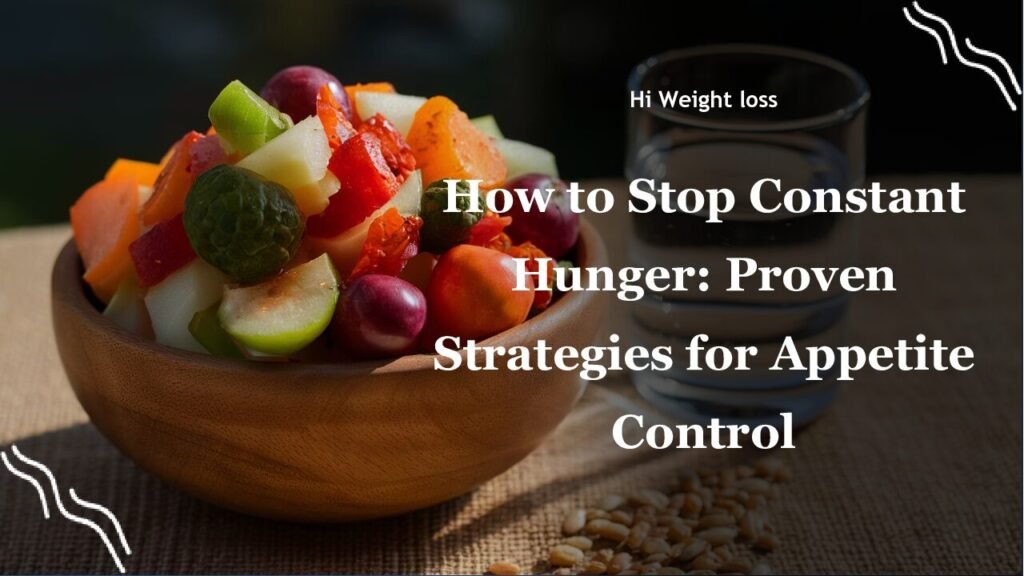“`
Do you ever feel like you’re constantly battling the urge to eat, even when you’re not truly hungry? It’s frustrating, and it can feel like your body is betraying you. But what if I told you that you *can* regain control and stop feeling hungry all the time? In this article, we’ll explore actionable strategies, rooted in both science and personal experience, to help you regulate your appetite and find a healthier, more balanced relationship with food.
How to Stop Wanting to Eat All the Time?
Understanding the Root Causes of Constant Hunger
Before diving into solutions, let’s talk about *why* you might be experiencing this constant hunger. It’s not simply a lack of willpower. Several factors, from your diet to your sleep patterns, can influence your appetite.
I remember a period in my life when I felt like I was always reaching for a snack. It was exhausting! After some digging, I realized that my highly processed food diet and erratic sleep schedule were major contributors to my constant hunger. Understanding the problem made finding a solution so much easier.
Examine Your Diet and Eating Habits
What you eat plays a crucial role in how you feel throughout the day. A diet that is low in protein, fiber, and healthy fats can leave you feeling constantly hungry.
Think about it: if your meal is mainly carbohydrates, your blood sugar will spike quickly and then drop equally fast, leading to those nagging hunger pangs again soon after. As highlighted by Dr. Axe, incorporating more protein into your meals can keep you feeling full for longer.
To combat this, focus on including lean proteins (chicken, fish, beans), high-fiber foods (fruits, vegetables, whole grains), and healthy fats (avocados, nuts, olive oil) in your diet. When I started intentionally adding a source of protein to every meal, I immediately noticed a difference in my satiety levels.
Start a Weight Loss Program
Sometimes, a structured approach is necessary to tackle appetite issues. A well-designed weight loss program can address the underlying causes of constant hunger.
According to Juniper, an evidence-backed program can effectively suppress appetite, regulate metabolic function, and reduce cravings. These programs often include personalized dietary plans and lifestyle recommendations that are very helpful.
I know a friend who struggled with constant cravings for sugary snacks. She joined a weight loss program that focused on balanced nutrition and regular exercise. Not only did she lose weight, but she also found that her cravings significantly diminished, and she didn’t feel that constant hunger anymore.
Improve Your Sleep
Sleep is a cornerstone of overall health, and its impact on appetite is often underestimated. When you don’t get enough sleep, your hunger hormones go haywire.
Specifically, according to research on sleep, sleep deprivation can impact your appetite-inhibiting hormone, *leptin*, and your appetite-stimulating peptide, *ghrelin*. This imbalance can lead to increased appetite and food consumption.
I’ve definitely experienced this firsthand! During periods of poor sleep, I noticed I was much more likely to crave unhealthy snacks and eat much more than I needed. Aim for 7-9 hours of quality sleep per night to help regulate these hormones.
Incorporate Natural Appetite Suppressants
Certain foods and drinks can act as natural appetite suppressants, helping you feel more satisfied between meals.
Green tea, for instance, contains caffeine and soluble fiber, both of which can aid in appetite suppression. A good article from Dr. Axe also mentioned several other natural appetite suppressants such as ginger, peppermint, and even dark chocolate.
I’ve found that sipping on a cup of green tea in the afternoon often helps curb my cravings for sweets. Experiment with these natural options and see what works best for you.
Eat Regular Meals and Practice Mindful Eating
Skipping meals can actually backfire, leading to intense hunger later on. Eating regularly helps keep your blood sugar levels stable, preventing those energy dips and cravings.
Additionally, *mindful eating*, or savoring your meals, is a key part of satiety. Pay attention to your body’s signals. According to research on mindful eating, eating slowly allows your brain to register fullness, helping to prevent overeating.
I used to rush through my meals, barely noticing what I was eating. Once I started eating more mindfully, I realized I felt much more satisfied with smaller portions, and felt fuller for longer. I found that putting my fork down between bites and focusing on the flavors of my food helped tremendously.
Increase Fiber Intake
Fiber is a powerful tool in managing your appetite. High-fiber foods slow down digestion, helping you feel fuller for longer periods.
This is because fiber absorbs water, adding bulk to your stomach and keeping you full. As explained by WebMD, good sources of fiber include fruits, vegetables, whole grains, and beans.
I’ve found that adding more veggies to my plate and snacking on fruits between meals has made a big difference in how quickly I get hungry. Try incorporating a few of these into each of your meals and you should feel that difference!
Stay Hydrated
Did you know that sometimes, thirst can be confused with hunger? Dehydration can send mixed signals to your brain, making you think you need food when you actually need water.
Drinking plenty of water throughout the day can help determine whether you’re truly hungry or simply thirsty. Dr. Axe also pointed out the benefits of consistent hydration.
I make a point to keep a water bottle with me all the time, and take sips frequently. Often, I find that when I think I’m hungry, a glass of water will actually hold me over for a bit.

Strategies in Action
Let’s summarize some of the specific strategies we’ve talked about in a more practical way. Here’s a table summarizing the core concepts:
| Strategy | How It Helps |
|---|---|
| Balanced Diet | Keeps you full with protein, fiber, and healthy fats, preventing cravings. |
| Weight Loss Program | Regulates metabolism, suppresses appetite, and reduces cravings. |
| Adequate Sleep | Balances hunger hormones, reducing the urge to overeat. |
| Natural Appetite Suppressants | Offers natural methods to reduce cravings between meals. |
| Regular Meals | Maintains stable blood sugar and prevents extreme hunger. |
| Mindful Eating | Helps you register fullness and prevents overeating. |
| High Fiber Intake | Slows digestion, promotes fullness, and reduces overall need to eat. |
| Hydration | Distinguishes between hunger and thirst, reducing unnecessary snacking. |
Conclusion
It’s certainly possible to stop feeling hungry all the time. As we’ve explored, constant hunger often stems from a combination of factors, including your diet, sleep habits, and lifestyle. By examining these areas closely, you can make informed changes that will significantly impact your overall well-being. Remember the story about my own personal struggle? Understanding how my diet and sleep affected my appetite was the first step in a powerful transformation. This kind of self-awareness is crucial for managing your hunger effectively.
Focus on incorporating a balanced diet, prioritizing sufficient sleep, practicing mindful eating, increasing your fiber intake, and staying hydrated. Consider incorporating natural appetite suppressants like green tea, and be willing to experiment and see what works best for *you*. You can start today by making one small change. Perhaps adding one extra serving of vegetables to your plate, or by creating a consistent bedtime routine. These small changes can compound over time, making a big difference in how you feel. Take the first step today! Share this article with anyone who may need it, and let’s create a healthier, more balanced future for ourselves.
FAQ
Why do I feel hungry right after eating?
This could be due to eating a meal that is high in simple carbs and low in protein and fiber. These meals can cause blood sugar spikes followed by rapid drops, which trigger hunger soon after you have just eaten.
Can stress cause me to feel hungry all the time?
Yes, stress can increase cortisol levels, which can lead to increased appetite and cravings, particularly for comfort foods. Finding ways to manage stress can help regulate hunger.
How long does it take to regulate my appetite?
It varies for everyone, but you might start noticing changes within a week or two of making consistent adjustments to your diet and lifestyle. However, it can take several weeks or even months for these new habits to become ingrained and for your appetite to fully stabilize.
Should I see a doctor if I’m always hungry?
If you have constant hunger that persists despite trying these strategies or if you’re experiencing other unusual symptoms, it’s important to consult with your doctor. There may be an underlying medical condition that needs addressing.
Are there any supplements that help with appetite?
Some supplements such as fiber supplements can help to create a feeling of fullness. However, before taking any supplements, it’s best to speak with your doctor or a dietitian, as some supplements may interact with medications or have other effects on your body.
“`



